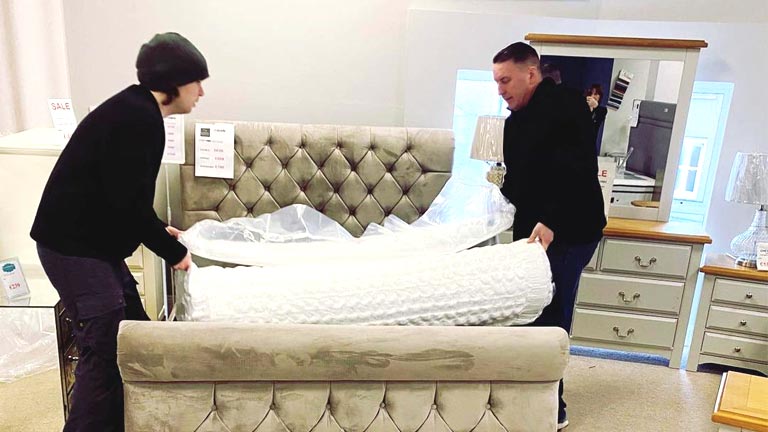
A good night’s sleep is essential for a guest’s well-being and overall satisfaction with their hotel stay. The quality of the mattress plays a significant role in this, as it directly affects comfort, support, and the ability to achieve restorative sleep. Therefore, hotels must invest in quality mattresses and replace them when necessary. Learn everything you need to know about how frequently hotels change mattresses and more here!
Factors That Influence the Lifespan of Hotel Mattresses
Several factors can influence the lifespan of a hotel mattress, including:
- The type of mattress: Different types of mattresses have varying lifespans. For example, innerspring mattresses typically last 5-7 years, while memory foam and latex mattresses can last up to 10 years or more.
- Usage: Hotel mattresses are subject to more wear and tear than residential mattresses due to the high occupancy rates and frequent turnover of guests. It can accelerate the deterioration of the mattress and shorten its lifespan.
- Maintenance: Proper maintenance and care of the mattress can significantly impact its longevity. Regular cleaning, rotating, and flipping the mattress can extend its lifespan by evenly distributing wear and preventing the formation of indentations and sagging.
- Quality: High-quality mattresses made with durable materials and construction are more likely to withstand the test of time and maintain their comfort and support over the years.
How Often Do Hotels Change Their Mattresses?
There is no one-size-fits-all answer to this question, as the frequency with which hotels change their mattresses depends on factors such as mattress type, quality, and usage. However, as a general rule of thumb, hotels tend to replace their mattresses every 5-10 years.
Luxury hotels with higher-end mattresses may be able to extend the lifespan of their mattresses to 10 years or more with proper maintenance and care. On the other hand, budget hotels with lower-quality mattresses may need to replace them more frequently, typically every 5-7 years.
It’s essential for hotels to regularly assess the condition of their mattresses and make replacement decisions based on guest feedback, visual inspections, and the performance of the mattresses over time.
The Role of Mattress Quality in Hotel Guest Satisfaction
The quality of a hotel’s mattresses can have a significant impact on guest satisfaction for several reasons:
- Comfort: A comfortable mattress is essential for a good night’s sleep, a top priority for most hotel guests. High-quality mattresses can provide the necessary support and comfort to ensure guests wake up feeling refreshed and well-rested.
- Health: A poor-quality mattress can contribute to various health issues, such as back and neck pain, poor posture, and sleep disturbances. Ensuring guests access a quality mattress can help promote their overall health and well-being during their stay.
- Perception of value: When guests perceive that a hotel has invested in high-quality mattresses, it can create a sense of value and luxury, enhancing the overall guest experience and satisfaction.
Signs That a Hotel Needs to Replace Its Mattresses
There are several signs that a hotel may need to replace its mattresses, including:
- Visible wear and tear: If a mattress shows signs of visible wear, such as sagging, indentations, or tearing in the fabric, it’s likely time for a replacement.
- Guest complaints: If a hotel receives frequent complaints about the comfort or support of the mattresses, it indicates that they need to be replaced.
- Age: As previously mentioned, hotel mattresses generally have a 5-10-year lifespan. If a hotel’s mattresses are approaching or have surpassed this age range, it’s time to consider replacements.
- Decreased performance: If the mattresses no longer provide the same level of comfort and support they once did, despite regular maintenance and care, it’s a sign that they are nearing the end of their useful life.
The Process of Selecting and purchasing New Mattresses For Hotels
When it comes time for a hotel to replace its mattresses, there are several factors to consider in the selection and purchasing process:
- Budget: Hotels must determine an appropriate budget for mattress replacements, considering factors such as the desired quality of the mattresses and the number of rooms that require new mattresses.
- Guest preferences: Understanding guest preferences and needs is critical when selecting new mattresses. Hotels should consider factors such as firmness, support, and materials that cater to a wide range of guest preferences.
- Durability: Hotels must select mattresses built to withstand the high usage and wear and tear of hotel environments.
- Warranty: When purchasing new mattresses, hotels should consider the warranty offered by the manufacturer, as this can provide additional peace of mind and protection in case of any defects or issues with the mattresses.
- Vendor relationships: Establishing strong relationships with reputable mattress vendors can help hotels negotiate better pricing and ensure a consistent supply of quality mattresses.
Eco-Friendly Mattress Disposal & Recycling Options For Hotels
When it’s time to replace mattresses, hotels should consider eco-friendly disposal and recycling options to minimize their environmental impact. Some options include:
- Donating: Hotels can donate their used mattresses to local charities, shelters, or non-profit organizations, providing a valuable resource for those in need.
- Recycling: Many cities have mattress recycling programs that can help hotels responsibly dispose of their used mattresses. These programs typically break down mattresses into components, such as foam, fabric, and metal, which can then be recycled and repurposed.
- Upcycling: Hotels can explore creative ways to upcycle their used mattresses, such as repurposing the materials for art installations or other functional uses within the hotel.
How to Ensure the Longevity of Hotel Mattresses
How is it possible to maximize the lifespan of hotel mattresses? It’s all about implementing proper maintenance and care practices, such as:
- Regular cleaning: Hotels should establish a routine cleaning schedule that includes vacuuming the mattresses, spot-cleaning stains, and sanitizing the mattress surface.
- Rotating and flipping: To ensure even wear and prevent sagging or indentations, hotels should regularly rotate and flip their mattresses (if applicable).
- Protective covers: High-quality, waterproof mattress protectors can help safeguard the mattress from spills, stains, and allergens, prolonging its life.
- Proper support: Ensuring the mattress is adequately supported by a sturdy bed frame or foundation can help prevent sagging and other structural issues.
As a hotel owner or manager, it’s essential to prioritize the comfort and well-being of your guests by providing them with high-quality, supportive mattresses. By doing so, you’ll not only enhance the guest experience but also contribute to your hotel’s overall success and reputation.




